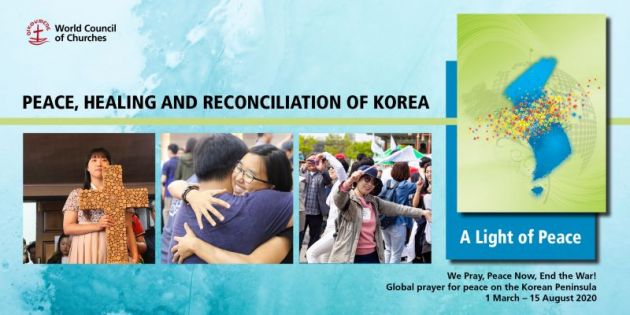Peace treaty is essential next step for the Korean Peninsula say churches

Churches throughout the world are calling for a peace treaty to formally end the Korean War that started 70 years ago.
They were on June 25 also calling for the normalization of relations between the Democratic People's Republic of Korea (North Korea) and the United States, in the quest for a peaceful future for the Korean Peninsula.
Seventy years ago, the war began in northeast Asia and left the Korean Peninsula devastated.
Fighting was suspended by a ceasefire – the Armistice Agreement of 1953 – but the war has never been formally declared over or a peace treaty concluded.
Special prayers and efforts are needed for a shared peaceful future on the Korean Peninsula future on this anniversary occasion, say the churches.
And renewed escalation of tensions in the region recently put the world on edge again.
A Joint Ecumenical Peace Message for the 70th anniversary of the start of the Korean War was publicly delivered on June during a live-streamed event which acknowledged these tensions but described them as evidence of the urgent need for new initiatives for peace.
Co-sponsored by churches and councils of churches around the world, especially from countries that participated in the Korean War, the message describes the war as an "appallingly destructive conflict".
They are calling for healing wounds for a shared future for the long-divided Korean people.
SOMBER ANNIVERSARY
"On this somber 70th-anniversary occasion, we, as churches and councils of churches from countries that played a role in the division and conflict on the Korean Peninsula, join in calling for: An immediate formal declaration of the end of the Korean War."
They are also calling for swift steps towards the adoption of a peace treaty to replace the 1953 Armistice Agreement, as a starting point for further progress towards the realization of a permanent peace regime on the Korean Peninsula.
They note that "Seven decades after this war began, it is time to acknowledge that it ended long ago. New challenges to peace and stability in the region have arisen in the meantime, but we do not believe that the resolution of those challenges will be facilitated by keeping that 70-year-old conflict open."
"On the contrary, we believe that the conditions for pragmatic dialogue and negotiation on current realities on the Peninsula could be greatly enhanced by recognizing the end of the war."
They urge resumption of dialogue between the South Korea and North Korea, and between the United States and the DPRK, with the encouragement and support of other states who were involved in the Korean War.
They call for the normalization of diplomatic relations between the DPRK and the USA. The churches are also calling for the suspension and cancellation of any further military exercises in the region.
"We appeal for the fulfilment of the letter and spirit of all the agreements that had given so much hope of progress towards peace on the Korean Peninsula – in particular the Panmunjom Declaration of April 2018, the Pyongyang Joint Declaration of September 2018, and the Singapore Joint Statement of June 2018."
At a Peace Convocation on June 20, people holding blue umbrellas as a symbol of unity prayed, walked and called for peace together.
The convocation, coordinated by the Presbyterian Church in the Republic of Korea, commemorated 70 years since the start of the Korean War. Held at the White Horse Hill Memorial in Cholwon, the observance took place on one of the most ferocious battlefields of the Korean War.
In a peace message read aloud, participants prayed: "Here we pray that God may hear the cry of the victims' blood from the ground and grant them peace," adding, "We pray for God's grace that we may be strengthened to reflect our path of the past and heal our wounds of the war."
In a message to the convocation, WCC interim general secretary Rev. Ioan Sauca wished both grace and peace to all those near and far who were supporting the peacemakers.
"In this important moment for witness for peace, we are committed and determined to pursue the Christian calling to be peacemakers, the vision of peaceful coexistence between North and South, and ultimately the reunification of the long-divided Korean people," wrote Sauca.